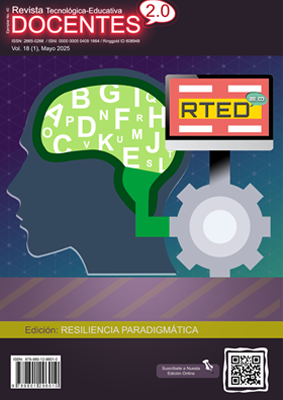Contribution of Bioethics in the Formation of the Pedagogical Knowledge of the Health Professional
 DOI:
https://doi.org/10.37843/rted.v18i1.640
DOI:
https://doi.org/10.37843/rted.v18i1.640
Main Article Content
Abstract
As a science, bioethics deepens the study of bioethical principles and their application. It is considered a branch of ethics due to its notable relevance to life and society. This research explored integrating bioethical principles into developing pedagogical knowledge among healthcare professionals at the UCV School of Dentistry. This research was conducted within the humanistic paradigm, using the hermeneutic method, a qualitative approach, a narrative design, an interpretive design, and a cross-sectional approach. The sample comprised 10 faculty members from the Central University of Venezuela School of Dentistry. The data collection technique used was interviews. The data obtained was analyzed qualitatively, and the relevant findings from the technique were interpreted. The integration of bioethical principles influences the development of pedagogical knowledge among healthcare professionals by providing an ethical framework to guide their practice. As these principles become integrated into education and training, positive changes in healthcare are likely to occur in the future.
Downloads
Metrics
Article Details

This work is licensed under a Creative Commons Attribution-NonCommercial-NoDerivatives 4.0 International License.
Those authors who have publications in our journal accept the following terms:
- When a work is accepted for publication, the author retains rights of reproduction, distribution of his/her article for exploitation in all countries of the world in the format provided by our magazine and any other magnetic medium, optical, and digital.
- Authors will retain their copyright and guarantee the journal the right first to publish their work, which will be simultaneously subject to the Creative Commons Acknowledgment License (Attribution-NonCommercial-NoDerivatives 4.0 International (CC BY-NC-ND 4.0)). That allows third parties to copy and redistribute the material in any medium or format, under the following conditions: Acknowledgment - You must properly acknowledge authorship, provide a link to the license, and indicate if any changes have been made. You may do so in any reasonable way, but not in a way that suggests you have the licensor's endorsement or receive it for your use. NonCommercial - You may not use the material for a commercial purpose. NoDerivatives - If you remix, transform, or build from the material, you cannot broadcast the modified material. There are no additional restrictions - You cannot apply legal terms or technological measures that legally restrict you from doing what the license allows.
- Authors may adopt other non-exclusive license agreements to distribute the published version of the work (e.g., deposit it in an institutional archive or publish it in a monographic volume) provided that the initial publication in this journal is indicated.
- Authors are allowed and recommended to disseminate their work through the Internet (e.g., in institutional telematic archives, repositories, libraries, or their website), producing exciting exchanges and increasing the published work's citations.
- Request of withdrawal an article has to be done in writing by the author to the Editor, becoming effective after a written response from the Editor. For this purpose, the author or authors will send correspondence via e-mail: [email protected].
- The author will not receive financial compensation for the publication of his work.
- All Docentes 2.0 Journal publications are under the Open Journal System (OJS) platform at: https://ojs.docentes20.com/.
References
Aguirre, J. (2000). La educación superior y sus desafíos en el siglo XXI. Editorial Universitaria.
Arias, F. (2006). El proyecto de investigación: Introducción a la metodología científica (5ta ed.). Editorial Episteme.
Báez, R. (1995). Educación y salud: una relación indispensable. Fondo Editorial de la Salud.
Cantú-Martínez, P. C. (2015). Importancia de la bioética en la educación superior para una formación integral de profesionales. Revista Iberoamericana de Educación, 67(1), 45-60. http://dx.doi.org/10.4067/S1726-569X2015000100006 DOI: https://doi.org/10.4067/S1726-569X2015000100006
Castro, J. P., & Martínez, A. (2020). Formación continua de docentes en salud: un modelo deintervención. Revista de Educación y Salud, 12(2), https://doi.org/10.33554/riv.15.2.890 DOI: https://doi.org/10.33554/riv.15.2.890
Creswell, J. W. (2013). Qualitative inquiry and research design: Choosing among five approaches (3rd ed.). SAGE Publications.
Estebaranza, G. (1982). El saber pedagógico en la formación de los docentes. Editorial Académica.
García Gómez-Heras, J. (2012). Bioética y sustentabilidad: una visión potteriana. Revista de Bioética y Ciencias de la Vida, 28(3), 112-127. https://n9.cl/yt2nc
Hernández-Sampieri, R. & Mendoza, C (2018). Metodología de la investigación. Las rutas cuantitativa, cualitativa y mixta, Ciudad de México, México: Editorial Mc Graw Hill Education. DOI: https://doi.org/10.17993/CcyLl.2018.15
Hernández Sampieri, R., Fernández Collado, C., Baptista Lucio, M. del P. (2014). Metodología de la investigación (6° ed.). México: McGraw Hill Interamericana Editores S.A. de C.V.
Imbernón, F. (1999). La formación del profesorado y la educación para el cambio. Editorial Octaedro.
Jeff, E. (2002). Ética y sustentabilidad: El vínculo entre la moral y el desarrollo social. Editorial Universitaria.
Mujica-Sequera, R. M. (2023). Diseño Tecnopedagógico en la Programación Didáctica. Revista Docentes 2.0, 16(1), 43–48. https://doi.org/10.37843/rted.v16i2.313 DOI: https://doi.org/10.37843/rted.v16i2.313
Organización de las Naciones Unidas para la Educación, la Ciencia y la Cultura (Unesco). (2006). Declaración Universal sobre Bioética y Derechos Humanos. UNESCO.
Organización de las Naciones Unidas (ONU). (2005). Informe sobre el estado del planeta y los ecosistemas. ONU.
Potter, V. R. (1970). Bioethics: Bridge to the Future. Prentice-Hall.
Reich, W. T. (Ed.). (1978). Encyclopedia of Bioethics.Free Press.
Ruiz de Chávez-Guerrero, M. (2014). Bioética y educación en México: Convenios y estrategias de implementación. Consejo Nacional de Bioética.
Tettamanzi, D. (1997). Ética y bioética en la práctica médica: una perspectiva académica. Ediciones Académicas.
Tettamanzi, D. (2000). El papel de la bioética en la enseñanza universitaria de la salud. Editorial Médica.
Vidal, J. (2004). Los dilemas éticos en la experimentación humana: Desde Nuremberg hasta Helsinki.Editorial de CienciasMédicas.






